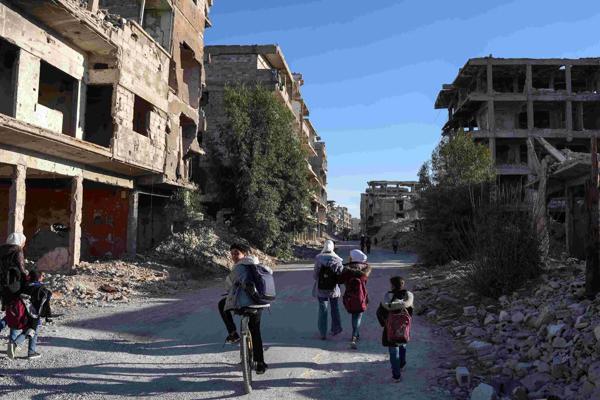Turkish ministries to extend support to rebuild Syria
ANKARA


All Turkish ministries are poised to contribute to Syria’s reconstruction by providing expertise and support in their respective fields after the ouster of the regime, in close collaboration with the authorities of the new interim government.
During the latest cabinet meeting, Turkish President Recep Tayyip Erdoğan instructed ministers to engage in initiatives in Syria within the scope of their areas of responsibility, Interior Minister Ali Yerlikaya said.
The state media on Dec. 25 reported that Türkiye began its support efforts for the reconstruction process in Syria, following the overthrow of the 61-year-old Baath party regime.
In this context, each ministry will provide assistance to restore Syria’s public institutions and rebuild the state apparatus within their domains.
The Interior Ministry will open migration bureau offices at the embassies and consulates in Damascus and Aleppo, which will be responsible for facilitating the exchange of records, identity data and other official documents between Turkish authorities and pertinent Syrian entities for refugees in Türkiye as needed.
Once Syria's Interior Ministry is fully reconstituted, support will be extended for critical functions such as population registration, security and the issuance of passports.
The Trade Ministry will facilitate the smooth transit of goods carried by Syrian returnees at the border as part of their returns, easing procedural complexities.
Simultaneously, the Transport and Infrastructure Ministry will focus on the restoration of Damascus International Airport, which has been open only for domestic flights since Dec. 18.
Türkiye also plans to re-establish railway connectivity between the two nations, with efforts to ensure the integrity of the rail network extending as far as Damascus.
In the domain of road infrastructure, the ministry will lend support to Syria in restoring critical highways, including the M4 and M5 corridors, which are crucial routes running parallel to the Turkish border.
The ministry will also continue working on the repair of bridges and other essential infrastructure along these vital routes.
The M4 highway, which runs through northern Syria, connects the port city of Latakia on the Mediterranean coast with other key towns such as Jisr ash-Shugur and Ariha, intersecting the M5 highway at Serakib in Idlib.
The ministry will also identify gaps in Syria’s communication infrastructure and provide support to address these needs Efforts will also be made to revitalize the country's ports.
Türkiye will extend assistance to Syria to re-establish its ability to issue its own currency as well.
In the military domain, the Turkish Defense Ministry will offer training and cooperation as needed, particularly in counterterrorism operations, in collaboration with the new Syrian administration.
As a critical entity in the reconstruction process, The Education Ministry has already contributed to the restoration of damaged schools, the construction of new educational facilities and the development of textbooks and curricula, bolstered by international donations.
Additionally, vocational schools will be established to address the severe shortage of skilled labor.
The Turkish ministry will also assist in crafting an educational curriculum that aligns with Syria's cultural heritage and historical context, ensuring that the education system reflects the nation’s values and identity.
The Culture and Tourism Ministry plans to offer support for the restoration of the country's cultural heritage, heavily damaged during the 14 years of civil war and will initiate preservation and landscaping work in the cemetery of the Ibn Arabi Mosque in Damascus.
Rebuilding the healthcare system is the main objective of the Turkish Health Ministry, while the Turkish Red Crescent has opened a delegation office at the Syrian Arab Red Crescent (SARC) headquarters in Damascus.
The Energy and Natural Resources Ministry will undertake a thorough assessment of Syria’s energy and electrical infrastructure, working to restore power and address supply deficits. Finally, the Family and Social Services Ministry will provide essential psychosocial support to women and children who have been disproportionately affected by the conflict, ensuring their mental health and well-being during the recovery process.
